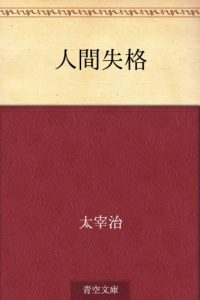 (ningen shikkaku – Dazai Osamu)
(ningen shikkaku – Dazai Osamu)
Ningen Shikkaku is one of the most famous novels in Japan. I have begun reading a novel by Miura Ayako, and Dazai is one of her influences, so I decided to go ahead and read one of his most famous works from Aozora Bunko in parallel.
It’s not a long book, but the language is challenging, and of course it is very grim. Dazai uses very long sentences, and sometimes entire paragraphs are comprised of only one sentence. The long sentences flow surprisingly well once you get used to the style, however if you need to look up too many words, then I think it would be hard not to get lost. I definitely wouldn’t recommend this to someone who isn’t used to reading in Japanese, but since it is in the public domain, it doesn’t hurt to give it a try.
There is already a lot of information in English about this book, as it was translated to English in 1958, but I want to mention a couple of scenes that made an impression on me. They will give away some of the plot.
Yozo and Tsuneko attempt suicide by jumping into the sea, and she succeeds but Yozo is saved. A relative is sent to take care of things, but his father disowns him from the family and never speaks to him again. I can’t even imagine a father doing this, although unfortunately I understand that many people can. I think his father’s inability to understand him and finally his completely giving up on him was a major motivation for Yozo‘s self-destructive lifestyle.
In one scene Yozo and his friend Horiki are playing drunken word games when Yozo asks Horiki to think about what the opposite of sin would be. Horiki seems angry that the game has become serious. Finally Yozo reaches the idea that the opposite of sin is punishment, right before he is interrupted by an extremely horrible situation. I realized that 罪 would be translated as “crime” instead of “sin” after Dostoevsky is referenced, but the English translation could go either way. I think punishment makes sense as the antonym from Yozo‘s dark and hopeless perspective. However, I think the opposite of “crime” or “sin” that he is looking for is “redemption” or “atonement”. He doesn’t quite reach that realization. To me this seemed to be the climax of the story, even though it is in the middle. Because of his negative outlook, Yozo rejects any blessings he receives and chooses to drown his anxiety and guilt in buffoonery, alcohol, and then ultimately morphine, so it’s a very frustrating and sad story.
Another memorable scene is when Yozo is being checked into the mental hospital and Yoshiko gives him his morphine, believing him that it is just to help him do his work and not the hard drug, which it is in reality. Her complete and misguided trust in him is the polar opposite to the complete distrust of all people that Yozo is plagued with, and both extremes are destructive to their lives.
Many of the reflections that people left on Bookmeter.com mention that you get more out of the book after repeated readings. I don’t think I will read it again because I don’t want to spend too much time in Dazai’s mind. I also acknowledge that there was a lot that I missed and didn’t understand due to the challenging writing style. However, I hope that now I will be able to spot references as they pop up in other works, since this book is popular enough in Japan that I think most authors would expect their readers to be familiar with it.

I also read this book too, though it was several years ago so I don’t remember many of the details. I do remember thinking the author was a pretty creative guy (maybe a genius?) at the time, though.
I think this would be alot of fun to translate, but it was translated into English quite a long time ago. After all, it’s an old book, so no surprise there.
Dazai was very prolific and there is a lot of his work available in public domain. If something is in public domain, then it looks like you can translate it and even retain the copyright of the translation as your own original work. This seems like a great opportunity for new translators to practice and demonstrate their translating skills.